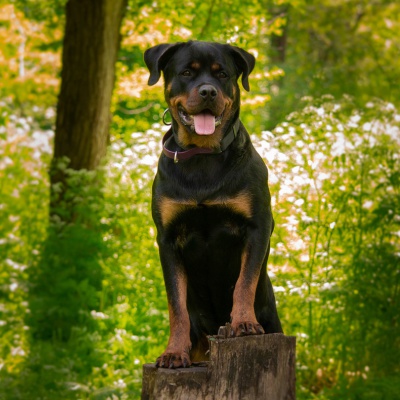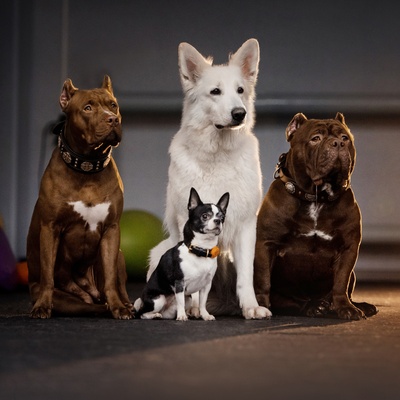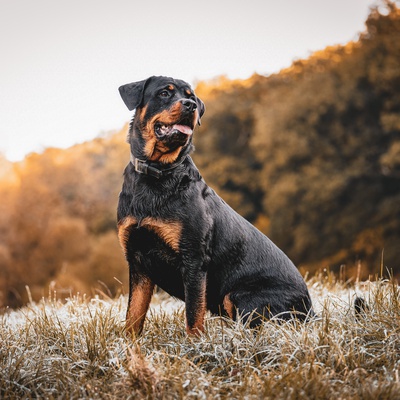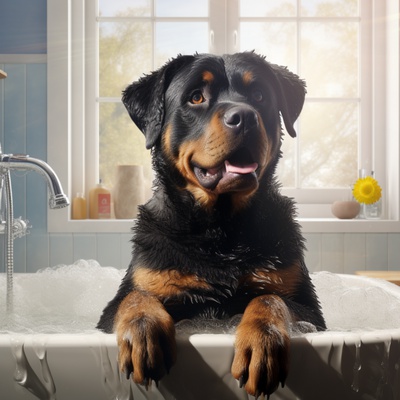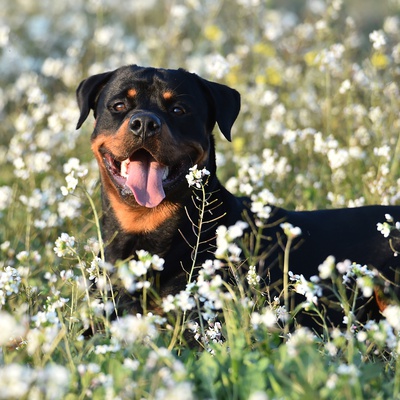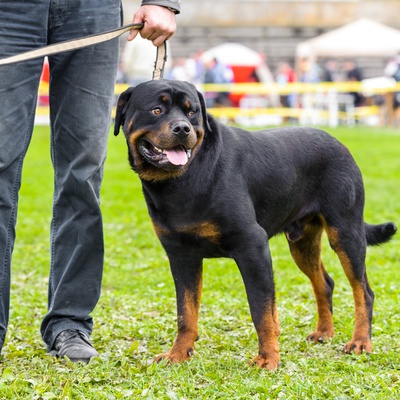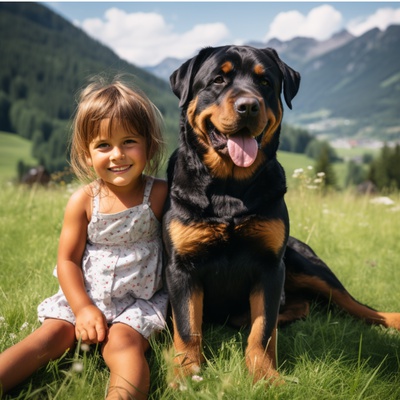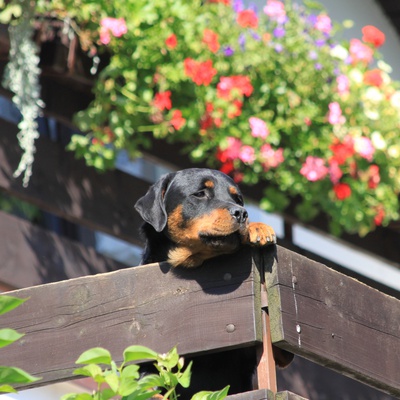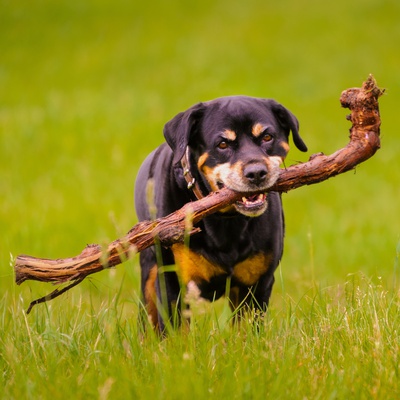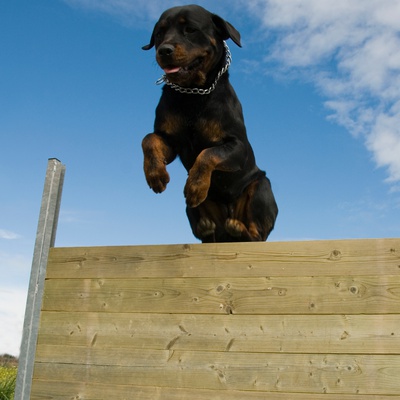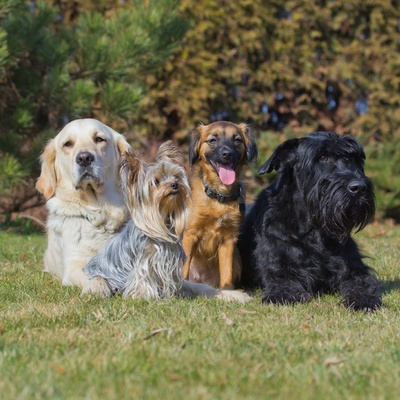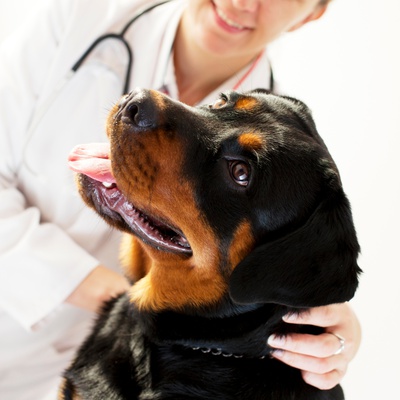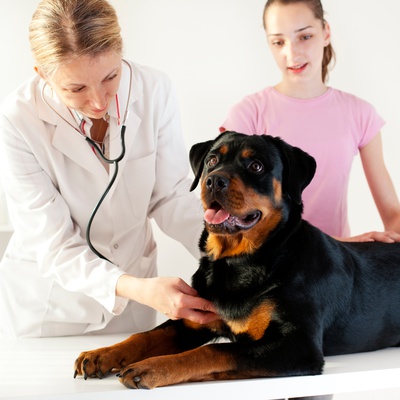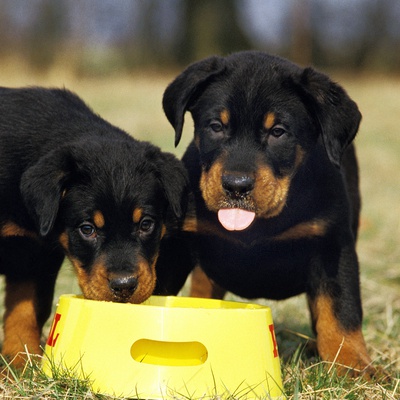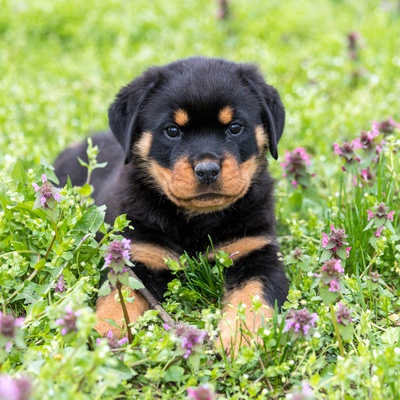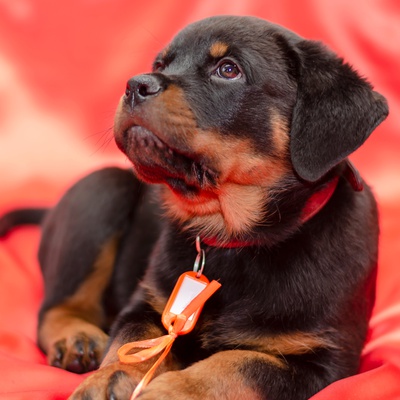Introducing the Rottweiler
Find out everything you need to know about the Rottweiler: its characteristics, its behaviour, its training and how much one costs.
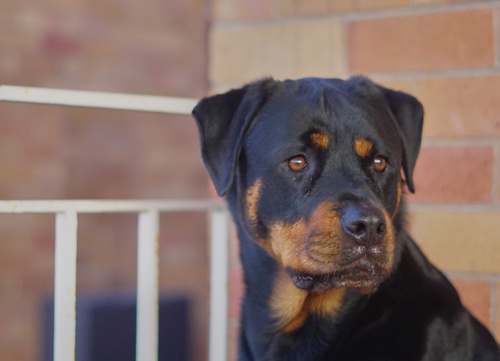
Find out everything you need to know about the Rottweiler: its characteristics, its behaviour, its training and how much one costs.
Tracing back to the Roman Empire, Rottweilers were originally bred to herd livestock and serve as guard dogs. Their deep roots in history manifest in their strong, confident demeanor, earning them a reputation as one of the world's most effective guard dogs. Yet, behind this protective exterior lies an array of exceptional qualities.
Rottweilers excel in various domains, ranging from police and military work to search and rescue missions. Their undying loyalty and unwavering courage make them not only exceptional workers but also cherished companions. Deeply loyal and often misunderstood, the Rottweiler is incredibly affectionate towards its family, showcasing an innate sociability and a tendency to shower loved ones with warmth and affection.
This section outlines the unique features of the Rottweiler breed of dog.
The Rottweiler, originally from Germany, falls into group 2, known for working dogs, especially mastiff types. They were historically used for herding and guarding due to their strength and temperament.
Rottweilers are known for their robust stature. They typically stand between 22 to 27 inches at the withers, with their weight ranging from 80 to 135 pounds, depending on gender and overall health.
Rottweilers sport a short, straight coat, offering them an elegant yet formidable appearance. This dense coat serves to protect them from harsh weather conditions.
Rottweilers typically have a sleek black coat with distinctive rust or mahogany markings on their cheeks, eyes, chest, and legs, creating a striking and imposing appearance.
Ideally, Rottweilers thrive in spacious environments, allowing them room to play and exercise. A secure yard is beneficial for them to roam, but they also appreciate indoor time with their families.
Rottweilers, known for loyalty and protectiveness, can be affectionate with families. Proper socialization is vital for interactions with children and other pets, given their dominant nature.
Rottweilers, with their sturdy build, are generally healthy. However, they can be predisposed to certain conditions like hip dysplasia and heart issues. Regular check-ups and a balanced diet help in maintaining their well-being.
Rottweilers are intelligent but require consistent, positive reinforcement due to their strong-willed nature. GPS devices like Weenect can aid in training by preventing wandering during command learning.
We can help!
Every dog has its own character, and so do you. Making the right choice will ensure his well-being and yours.
Take our quiz to find out which breed is right for you, based on your personality, lifestyle, location and many other criteria.
Don't wait any longer and take the quiz to find out the answer!
The Rottweiler's robust physique, glossy black coat, and striking rust-colored markings, combined with their penetrating dark eyes, exude strength and confidence.
Standing proud and tall, female Rottweilers typically measure between 22 and 25 inches, while their male counterparts can stand up to 27 inches.
In terms of weight, females usually fall in the range of 80 to 95 pounds, while males can tip the scales between 95 and 130 pounds.
Rottweiler puppies exhibit a notable growth spurt. Within the initial months, these pups can gain around 1.5 to 2 pounds every week. They continue to grow steadily and usually attain their full height and weight by the age of 2 to 2.5 years.
Rottweilers possess a short, dense coat that lies flat against their body. This sleek coat is manageable, providing the breed with a sharp and polished appearance. Unlike breeds with feathering, Rottweilers have a more uniform coat length across their body.
The coloration of the Rottweiler is distinct and easy to recognize. Typically, Rottweilers sport a black coat with defined rust to mahogany markings over their eyes, cheeks, each side of the muzzle, legs, and chest. This contrast of deep black with rich, warm markings is a signature feature of the breed.
The Rottweiler's coat, with its short length and dense undercoat, is designed to provide protection against harsh conditions. While they do shed, it is not as profuse as some longer-coated breeds. However, during the shedding season, typically in spring and fall, the shedding can be more noticeable. Regular brushing, about once a week, is beneficial for the Rottweiler, helping to remove loose fur and distribute the natural oils of the skin.
Their coat is also relatively low-maintenance in terms of bathing; washing them once every couple of months or when particularly dirty is often sufficient. It's essential to ensure that they are thoroughly dried and not left damp, especially in colder climates, to avoid potential skin issues.
The Rottweiler is a robust and powerful breed, exuding an impression of both strength and endurance. It carries itself with a balanced and well-proportioned frame, showcasing its inherent agility and stamina. Their eyes are of medium size, almond-shaped, and range from deep brown to slightly lighter shades, giving them a vigilant and confident expression. The Rottweiler's ears are medium-sized, pendant, triangular, and are carried forward with the inner edge lying tightly against the head.
The body is compact and muscular, a testament to the breed's herding and guardian roots, reflecting its power, agility, and endurance.
The Rottweiler is known for its unwavering loyalty, fierce protective instincts, and deep-seated affection towards its family.
Presently, there are over 400 recognized dog breeds, grouped into 10 distinct categories based on their shared attributes and lineage.
The Rottweiler falls under group 2, alongside breeds like the Bernses Mountain Dog, Cane Corso, Mastiffs, and others. These breeds are celebrated for their strength, dedication, and versatility, often excelling as guardians, herders, or service dogs.
Rottweilers are known for their intelligence and bravery, making them reliable workers. Originally bred for herding and guarding, they are fiercely loyal protectors of their families.
Rottweilers are often viewed as formidable because of their strong and dominant appearance. However, deep down, they are incredibly affectionate and form strong bonds with their families. Their unwavering loyalty makes them extremely protective, always ready to guard their loved ones.
While they are fiercely devoted, they also crave attention and thrive in the company of their owners. It's vital for Rottweiler owners to be present and actively engaged in their upbringing to ensure they mature into well-balanced adults.
At their core, Rottweilers are generous and sociable creatures, always eager to engage and interact. They generally get along well with humans, especially when introduced to them from a young age. Their robust and gentle nature can make them great companions for children, though supervision is always recommended.
However, their powerful stature and protective instincts can sometimes be misunderstood. It's crucial to emphasize early and consistent socialization to foster their amiable nature and ensure they are approachable and friendly around both familiar faces and newcomers.
Rottweilers, with their calm demeanor and sturdy build, can adapt to a range of living situations, be it apartments or spacious homes, urban centers or tranquil countryside. However, the key to their contentment isn't necessarily the size of their home but the quality of attention they receive. Owners need to be dedicated, providing ample time for bonding and daily activities. For a breed as active as the Rottweiler, two walks a day, each spanning at least 45 minutes, is a must to keep them physically and mentally stimulated.
While Rottweilers are adaptable, they thrive in open spaces where they can be active and purposeful. Their working dog heritage means they have a natural desire to be active and explore. Access to outdoor areas, such as yards or parks, allows them to channel their energy, curiosity, and instincts, whether it's playing fetch, enjoying agility games, or simply running freely.
Rottweilers are quick learners with a natural protective instinct. Training should focus on positive reinforcement and consistency. Equipping them with a GPS collar can help track their strong presence if they wander.
With keen listening skills, Rottweilers excel as working dogs. Early socialization is vital for their well-rounded behavior. Their versatility ranges from herding to therapy roles, showcasing their loyalty and adaptability.
Take the test and find out the dog breed that matches your personality and lifestyle.
Rottweilers, known for their strength and endurance, are generally hardy dogs. However, to maintain their robust health, daily care and prevention of potential ailments are paramount.
Rottweilers boast a robust health profile overall. But like any breed, they're not immune to health concerns. Common predispositions for Rottweilers include hip and elbow dysplasia, as these are large dogs. Additionally, heart problems, such as aortic stenosis, and certain types of cancers can be concerns. Awareness of symptoms and early diagnosis are crucial for the well-being of this breed.
Typically, a well-cared-for Rottweiler has a lifespan ranging from 8 to 10 years.
Regular veterinary visits throughout the Rottweiler's life are non-negotiable. Vaccinations, deworming, and flea treatments should be administered as per vet recommendations.
It's essential to clean their ears regularly to fend off infections. Dental hygiene is equally significant; brushing their teeth can prevent tartar buildup and gum disease. Nail trimming, though sometimes challenging given their strength, is necessary for their comfort and health.
While Rottweilers are not known for allergies, it's always a good idea to be vigilant. Any unusual behavior or signs should be discussed with a vet. Note that the Rottweiler is not classified as a hypoallergenic breed.
Just as with any other breed, Rottweilers have specific dietary necessities that cater to their unique build and energy levels. A balanced diet, packed with essential proteins and vital vitamins, is paramount to ensuring their dynamic vigor and strength. For a consistent and nutritionally comprehensive diet, we advise offering your Rottweiler high-grade kibble tailored to their breed's requirements.
For those Rottweilers with heightened activity levels or additional protein demands, integrating lean cuts of white or red meat into their meals can be beneficial. However, it's crucial to monitor and limit fat intake to ensure your Rottweiler stays in optimal shape.
Being powerful dogs, Rottweilers have a hearty appetite. It's essential to adhere to feeding schedules and monitor portions to prevent overeating and potential weight gain.
The Rottweiler is a breed with a strong reputation. Before deciding to bring one into your home, there are important considerations to keep in mind.
Before adopting a Rottweiler, careful selection is crucial. Begin by ensuring the breeder is reputable. A visit to the breeder's premises is essential to assess the living conditions and behavior of the dogs.
Additionally, it's vital to check the health of both the puppy and its parents. Responsible breeders will provide transparent information about the puppy's health and any genetic illnesses in its lineage.
Lastly, remember that by the age of 8 weeks old, your Rottweiler must be microchipped, and their details should be registered on a relevant database like Petlog or Animal Tracker. This is a legal requirement in Great Britain, with potential penalties of up to £500 for non-compliance. Most veterinarians can microchip your dog for a small fee, and some organizations, like Blue Cross centers, offer this service for free.
The cost of acquiring a Rottweiler can vary significantly based on multiple factors. Considerations such as lineage, pedigree, breeder reputation, and the age of the dog all play a role in determining the price. Generally, Rottweiler puppies are priced anywhere from
to
when obtained from a breeder.
Beyond the initial acquisition cost, it's important to account for other expenses, including veterinary fees and food. On average, this annual cost can range from
to
, ensuring your Rottweiler's continued health and well-being.
Choosing a dog that matches your personality and lifestyle will ensure your well-being and his!
To access the most relevant information, suitable payment methods, and delivery in your region, please select the website corresponding to your country.
